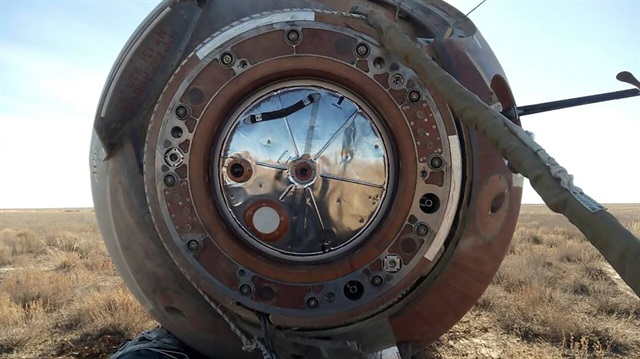
The head of Russia's space agency said on Friday that two astronauts who survived the mid-air failure of a Russian rocket would fly again and would provisionally travel to the International Space Station (ISS) in spring of next year.
Dmitry Rogozin, the head of Russian space agency Roscosmos, was speaking a day after Russian cosmonaut Alexei Ovchinin and American Nick Hague made a dramatic emergency landing in Kazakhstan after the failure of the Soyuz rocket carrying them to the orbital ISS.
Rogozin on Friday posted a picture on Twitter of himself sat next to the two astronauts and said they had now arrived in Moscow. Both men escaped unscathed and feel fine, Roscosmos has said.
The mishap occurred as the first and second stages of a Russian rocket separated shortly after the launch from Kazakhstan's Soviet-era cosmodrome of Baikonur.
Thursday's accident was the first serious launch problem experienced by a manned Soyuz space mission since 1983, when a crew narrowly escaped before a launch pad explosion.
The Interfax news agency on Friday cited a source familiar with the Russian investigation as saying that a faulty valve had caused the first stage of the Soyuz-FG rocket to malfunction even though the valve had been properly checked before take-off.
NASA has relied on Russian rockets to ferry astronauts to the space station since the United States retired its Space Shuttle programme in 2011, although the agency has announced plans for a test flight carrying two astronauts on a SpaceX commercial rocket next April.
Space is an area of cooperation between the United States and Russia at a time of fraught relations. Asked about the mishap, President Donald Trump told reporters at the White House he was "not worried" that American astronauts have to rely on Russia to get into space.
Moscow has suspended all manned space launches, while Rogozin has ordered a state commission to investigate what went wrong. Russia's Investigative Committee has also opened a criminal investigation into the matter.
Unmanned launches of the Progress spacecraft -- which carry food and other supplies to the ISS and use the same rocket system as Soyuz -- might also be suspended, Interfax has said.




